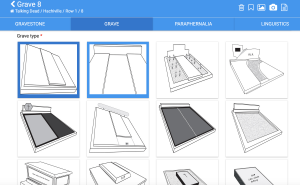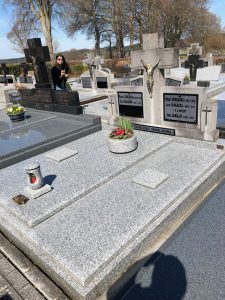Although the title may allude to a popular American TV-series, this research seminar did not deal with zombies. Yet, the dead do talk to us when we visit cemeteries. Besides its call for remembrance, a grave also conveys a range of other messages – from the Egyptian pyramids that conveyed an image of power to contemporary tombstones, which become more and more personalised as traditional religious symbols are being replaced by pictures that show for instance the beloved hobby of the deceased.
The three-semester research seminar “The Talking Dead” propelled the MAHEC students into the world of academic research and actual fieldwork. The first semester provided students with background knowledge in Cemetery Studies and Material Culture, ultimately asking them to come up with their own research proposal.
The second semester granted an insight into the early anthropological documentation of death by Robert Hertz (Death and the Right Hand, 1907) and Louis Van Gennep (Les rites de passage, 1909), but focused on fieldwork assignments. Students were assigned a cemetery to be surveyed using a tool, specially designed for the FNR sponsored research project R.I.P., to gather data. Based on photographs and measurements of graves taken on site, the tool allows recording all information about a grave (dimensions, materiality, epitaphs, ornaments, accessories). Additionally, the students, divided into groups of two, interviewed the cemetery administrator of the cemetery they were surveying, as well as a representative of the different religious denominations, which are to be found in Luxembourg. An interconfessional roundtable was also organized, where representatives of faith presented different funerary rites and traditions and answered the students’ question. All these data were later analysed and could be used by students in their final papers.
Screenshot of the CST (Cemetery Survey Tool)
Students (Anqi Cheng and Claude Ewert) surveying the cemetery in Hachiville (April 6th 2018)
The third semester was dedicated to individual tutorials, allowing students to discuss their ideas with the course supervisors and to the writing of their final paper, with the ultimate aim of publishing in a peer-reviewed journal.
Participants:
Students: Mélodie Blommaert, Anqi Cheng, Claude Ewert, Davina Kronz, André Marques, David Mechtel, Marvin Schieben, Sidney Wiltgen, Thomas Woloszyn
Course Instructors: Elisabeth Boesen, Sonja Kmec, Thomas Kolnberger, Benoît Majerus, Christoph K. Streb


